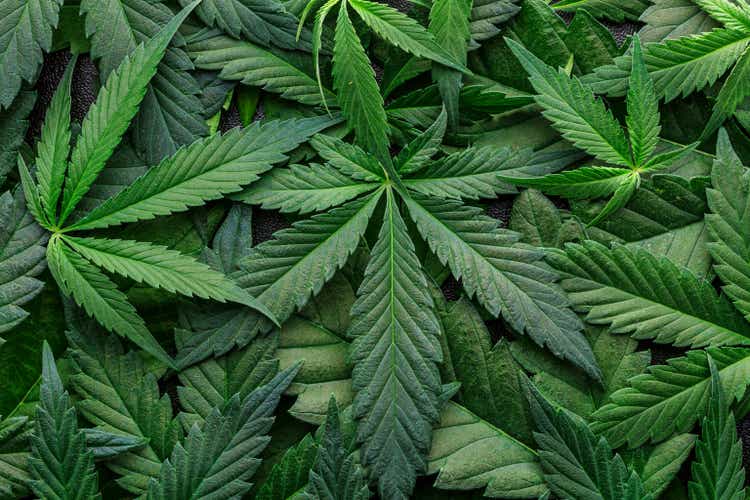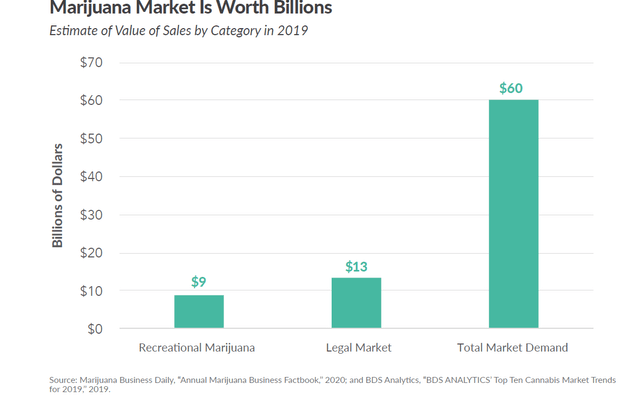IURII BUKHTA
By Alex Rosen
Summary
On the surface, the AdvisorShares Pure Cannabis ETF (NYSEARCA:YOLO) – which, in my opinion, wins the award for best ETF ticker symbol – looks like a bad investment as it’s down 38% since inception. If you can’t make money selling cannabis during a global pandemic that requires everyone to isolate, when can you? The answer is sooner rather than later. YOLO is well situated to really benefit from the end of prohibition both in the U.S. and around the world, as more and more companies are looking to take cannabis from the backrooms of head shops to a legitimate industry comparable to the alcohol sector.
In the U.S. alone, 38 of 50 states have legalized marijuana for medicinal purposes, and only five of the remaining 12 still fully criminalize it. Another 21 have fully decriminalized it, and President Biden recently pardoned thousands of people incarcerated for possession of marijuana.
Strategy
YOLO, one of the first-ever ETFs dedicated solely to the cannabis industry, focuses mainly on small- to mid-cap companies whose revenue is derived primarily from the marijuana and hemp industry. It also invests in companies that have registered with the DEA to conduct legal research and development of marijuana and marijuana-related products.
While it claims to be a global cannabis fund, 90% of its holdings are U.S.- or Canadian-based companies. Sectorwise, the fund leans toward healthcare and pharmaceuticals.
Proprietary ETF Grades
-
Offense/Defense: Offense
-
Segment: Aggressive
-
Sub-Segment: Cannabis
-
Correlation (vs. S&P 500): Low
-
Expected Volatility (vs. S&P 500): High
Holding Analysis
With a 95% turnover rate in an actively managed ETF, it is clear the fund managers are still trying to figure out what to invest in. For now, they have focused on pharmaceuticals and healthcare, as those are the only two sectors that are legally allowed to prescribe and distribute marijuana. However, the extremely volatile nature of the industry and rapid decriminalization both domestically and internationally almost demand that the fund actively seek out new areas for investment. Today’s criminal enterprise is tomorrow’s AgTech (agricultural technology) industry.
Strengths
Marijuana is an industry in its infancy, which – once decriminalized – is poised to take off. States that have gotten ahead of the curve on this are seeing windfall tax revenues, while states that resist are falling behind. Cannabis is not a complex crop to harvest. It does not require tremendous downstream investment or elaborate processing. It has the ability to immediately show large-scale profits. Additionally, there is currently a strong political will to make it accessible.
Marijuana Market worth Billions (Marijuana Business Daily, “Annual Marijuana Business Factbook,” 2020; and BDS Analytics, “BDS ANALYTICS’ Top Ten Cannabis Market Trends for 2019,”)
Weaknesses
It is hard to predict what will happen once marijuana is decriminalized on a federal level. Probably the best comparison is prohibition, but that was almost 90 years ago. Because of the federal status of cannabis, it is hard to determine who exactly the big players are in the industry and whether or not they’re legitimate businessmen. Similarly, the cryptocurrency industry looked like a sure thing a few years ago, but then suddenly it collapsed.
Opportunities
One of the biggest challenges facing the cannabis industry is access to capital markets. Due to the murky legal status of the industry, lenders are reticent to invest despite the potential for growth and high returns. Federal legalization is not a question of if, but when. When that happens, the industry will be able to properly access capital markets, and then we can see real growth.
When President Biden requested the pardon of over 6,500 people incarcerated for marijuana possession, he made it clear that the federal government intends to revisit how marijuana is classified under federal law. Currently, states that have legalized recreational marijuana are seeing outstanding tax revenues, while states that continue to criminalize marijuana are losing out on much-needed tax dollars.
Threats
One of the biggest threats is first-mover advantage. If the U.S. waits too long, by the time it has decriminalized marijuana on a federal level other countries will have already set up the infrastructure for growth and distribution. They will then be able to swoop in and capture the market, leaving American companies holding an empty bag.
Proprietary Technical Ratings
-
Short-Term Rating (next three months): Hold
-
Long-Term Rating (next 12 months): Hold
Conclusions
ETF Quality Opinion
YOLO is hard to define due to the high volatility and the fragility of the sector. It’s hard to get an accurate gauge on the holdings when, in reality, the really big players have yet to expose themselves. The cannabis industry of today will look very different from the cannabis industry of five years from now.
ETF Investment Opinion
We rate YOLO as a hold because, despite the uncertainty surrounding the players, there is no question about the product. Where there is a will, there is a way. Eventually, this industry will sort itself out and, when it does, it will soar very high. Until then, we just have to hold on and wait.


Be the first to comment